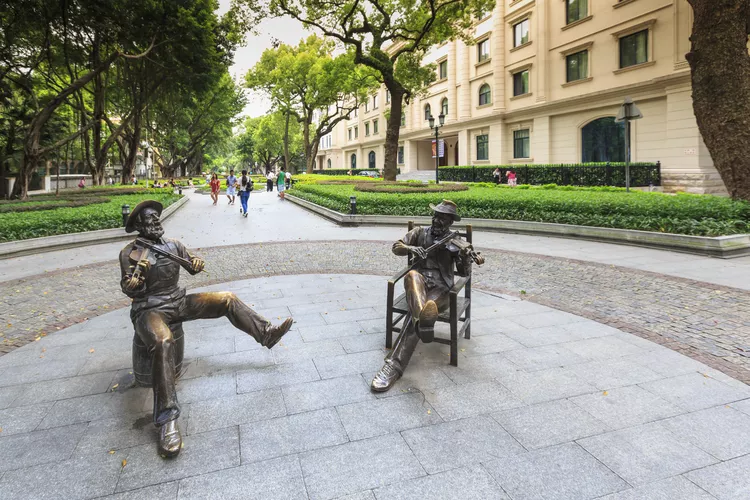With its grand buildings, swanky hotels, and riverside location, Shamian Island has established itself as Guangzhou’s main tourist area. This well-preserved colonial district features period architecture, tree-lined avenues, and a laidback appeal that offers a break from the mayhem and futuristic developments of downtown Guangzhou. Moreover, fine restaurants and alfresco riverside bars make a trip to the island a fantastic way to spend a leisurely half a day.
History
It’s important to note that while the island itself is tranquil, its history is far from serene. After a series of conflicts during the Opium Wars, Shamian Island became a territory that the British government seized from the Chinese Emperor as spoils of war.
Historically, in a nation that was previously closed to foreign influence, Shamian Island served as a base for Britain, France, and other colonial powers to import opium for local sales—what was then termed free trade.
One key regulation imposed on foreign traders was their restriction to the island itself, limiting their interactions solely to members of a local cartel appointed by the Chinese government. Tensions between officials and traders were common, leading to infamous events, such as the well-known raid where significant quantities of opium were discarded into the sea. Ultimately, many traders moved off the island after Britain negotiated a more secure base for their operations in nearby Hong Kong.
:max_bytes(150000):strip_icc():format(webp)/GettyImages-142746031-5c32241ec9e77c0001ddd6b2.jpg)
What to See
With approximately 150 buildings present on Shamian Island, over a third were constructed during its 19th-century colonial period. Set on a sandbar, the island stretches just one kilometer (less than a mile) long and is less than half that width, which makes it an easy place to explore on foot. One of the main attractions is walking along the peaceful, tree-lined streets and soaking up the atmosphere. Visitors can admire the sturdy Victorian houses, wrought iron gates, and lush gardens that evoke the charm of the Sussex countryside.
Several specific sights are particularly worth visiting. The French Catholic Church of Our Lady of Lourdes, characterized by its narrow structure and pastel-colored walls adorned with French inscriptions, retains a lot of its original charm. At the opposite end of the island, the British erected their Anglican church, Christ Church, whose solid construction and simple design resemble an English village church. Additionally, many of the island’s most impressive buildings once served as consulates for colonial powers and are marked with historical plaques.
Among the notable sites unrelated to colonial history is the White Swan Hotel. During the communist period, this hotel was one of the few in town accessible to foreigners. The White Swan gained additional fame as a base for American families adopting Chinese children. Although adoption rates have since declined, some prospective parents can still be spotted in the café, reviewing paperwork. The White Swan is renowned for its lobby, which features a tropical garden complete with palm trees and a waterfall, creating a serene oasis within the hotel.
How to Get to Shamian Island
To reach Shamian Island, take the Guangzhou subway line 1 and disembark at Huangsha Station. The island is just a short 10-minute walk from there, making it conveniently accessible for visitors.




